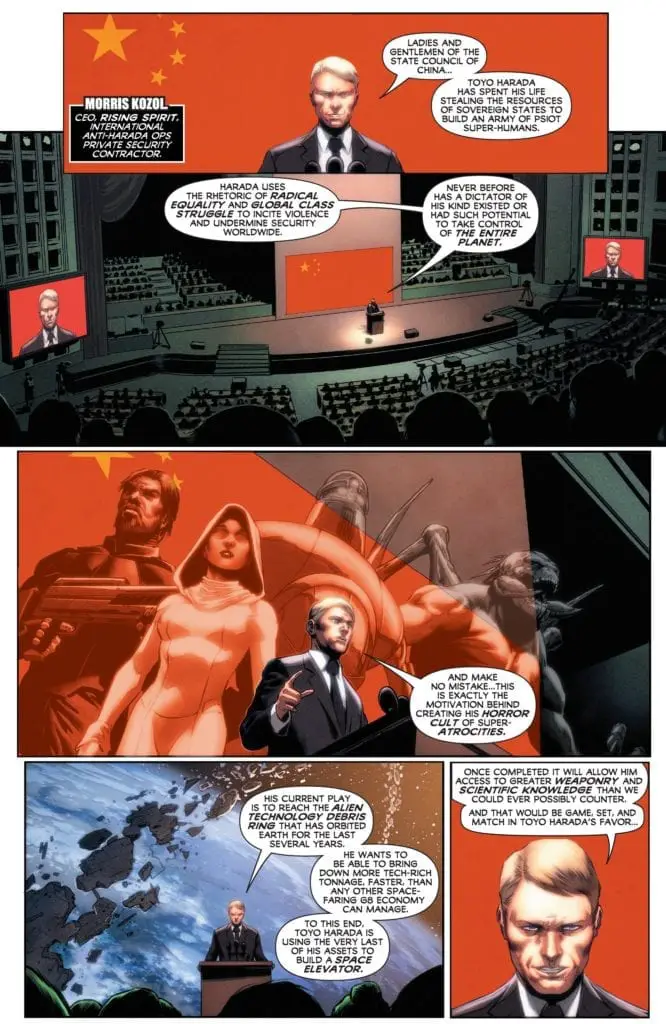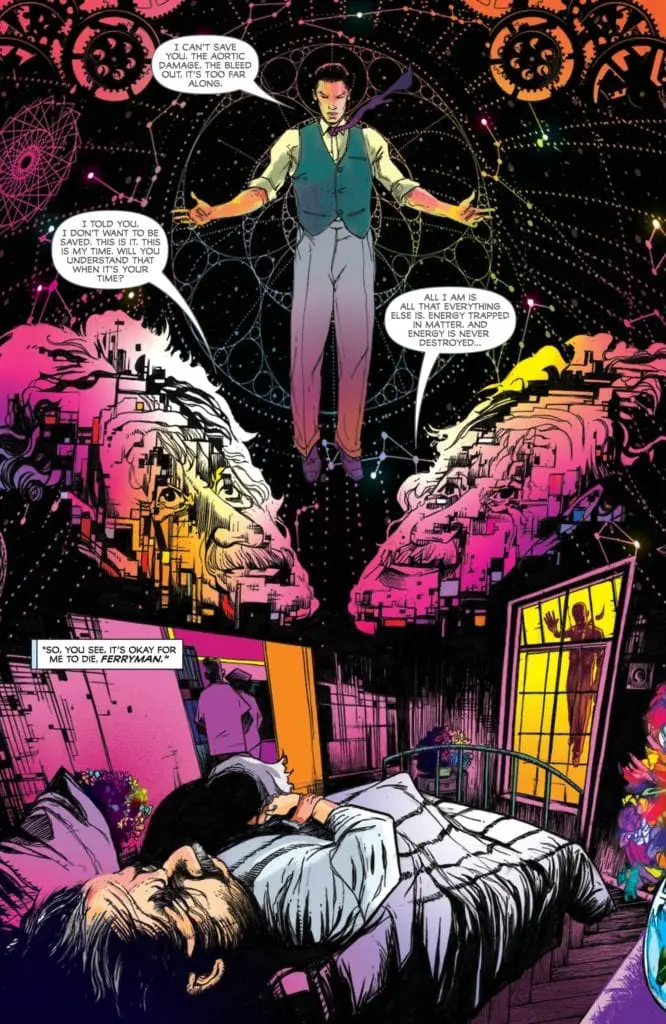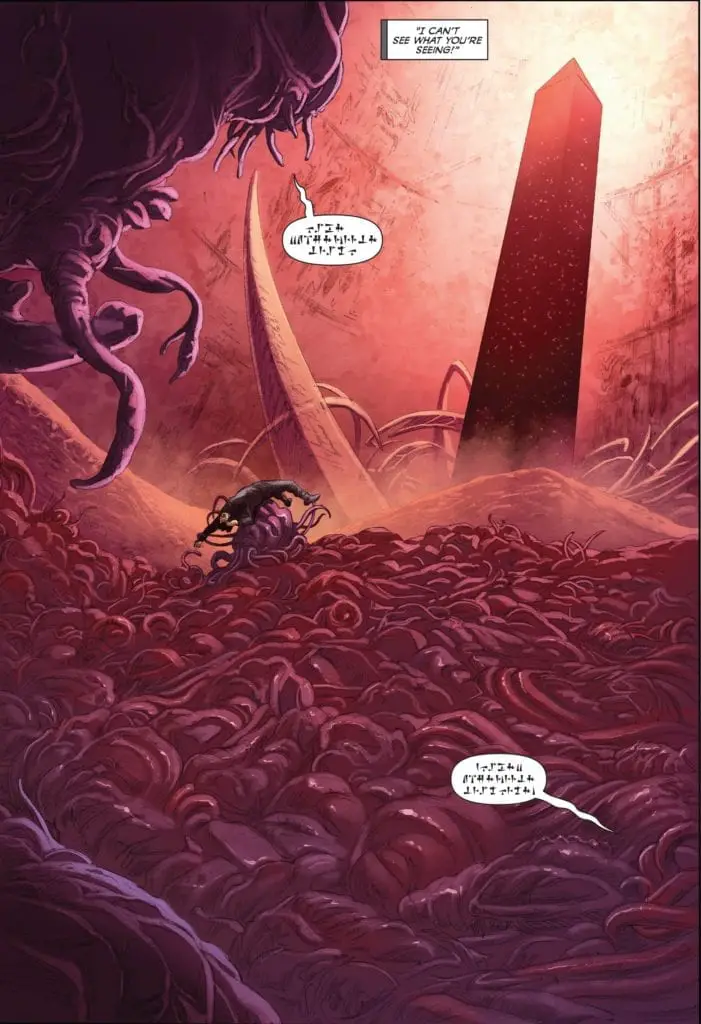In a world dominated by stories with giant and open continuities for every author to make their mark upon, it’s hard to wonder to pick something up because the story looks interesting. With any DC or Marvel comic you run the risk of not knowing past events that may or may not influence the next chapter or even worse the endless tie ins to major events within these shared universes. Sometimes it’s a real pleasure to just sit down and read a closed universe story that lasts for either a couple of issues or spans many. This is what I love most about Valiant Comics, The Life and Death of Toyo Harada. In this half science fiction, half philosophical drama we see that it is possible to create a high significant world without the burdens of giant comic lines and needless information. Every aspect of the story has a purpose and is drawn together so perfectly that even just a few pages in we’re engrossed and invested into a world we both know much and little about.
An Almost Spoiler-Free Synopsis
The story itself follows a few of the Superhero comic tropes but they’re not exactly hindering. It’s an easy way to draw in those familiar and unfamiliar towards independent comic reading. Harada is a child during the Second World War living in Hiroshima at the time when the nuke is dropped. Unfortunately, he is the only one to survive the devastation but is given a unique gift that manifests itself in various ways. Its main function is telepathy and mind control, of sorts. After learning to control these powers he begins to help post-war Japan recover by influencing the minds of the major leaders in its occupation.
Fast forward half a century and Harada now allies himself with several nations on a mission of world peace, that much of the rest of the world does not agree with. Through jumps in technological breakthroughs, biological and genetic engineering, and the use of alien debris, he plunges the world into rapid advancement in order to gain peace by offering these gifts to all. However, a private security force known as Rising Spirit, has its goal set upon both a military and smear campaign against Harada and his allies. Specifically using his team of genetically modified or “PSIOT” superhumans as a rallying cry of abominations. Well, LV-99 totally should count as one.

The first act is during the middle of an attack on Harada’s construction site where he’s helping build a great elevator that will reach a ring of alien debris orbiting the Earth…because comics. His goal in this project is so that even the poorest nations could have access to the technology in the debris that could help advance their technology by decades. However, Rising Spirit feeds the world another reason, that it’s to allow him direct access to technology that he will eventually use it to exact domination on the rest of the world.
Throughout the rest of the battle, we are introduced to his team, including an alien monolith that’s also a Lovecraftian horror? I’m honestly not really sure what to call Angela as her true form is basically a monolith that takes host forms and creates mind-control parasites and it’s all very weird. Her deal with Harada is that she will help him with using her own technology, advancing his own by hundreds of years but in exchange, he gives her a steady supply of pregnant women to experiment on. Apparently only a few hundred is not enough for her so a plot is hatched for his downfall. That’s all I’ll get into as I see it as an injustice to not read the rest of the book yourself. The story is just that good, for the most part.
Past and Present
Now while the story itself was great overall, I did get a little picky with some of its structure. While we did have a very quick jump from the bombing of Hiroshima to the present day; throughout the story, we are constantly pulled back from the present to see relevant scenes from the past. This method is used in almost every storytelling medium from screen to print. However, my issue with this is that it can be overused. This wouldn’t be a huge issue if every flashback holds some significance to what’s happening before and after. With reverting to this too many times throughout the story it’s easy to forget why you were even shown it to begin with.
This comic is packed with this device. Every issue has at least several moments where we see a younger Harada living his life and learning some profound lesson or explanation for his behavior in the present. Most of these flashbacks are well done, my favorite among them being his encounter with Einstein. It’s an example of what makes the philosophical aspects of the book so intriguing, but more on that later. Some others just get lost in over-explanation that either lost my attention or interest completely.

What is Free Will?
For me, the absolute best feature of this tale is the philosophical themes at play. To be specific, the first is the question of what constitutes free will. Throughout the comic, we are constantly reminded Harada’s one goal is to make the world a better and more peaceful place. To achieve this goal he releases most of the technology he creates or discovers freely to the public. Some examples include the great space elevator allowing all countries, even poor ones, to have access to technology decades more advanced than they are. Another, of course, being a completely self-sustaining super hospital set in areas of extreme war and poverty, which is also able to house refugees. Seems like a great idea?
In reality, it takes a lot of trust in humankind as a whole to be that open with such world-changing technology. Now, of course, the hospital is one thing. The only thing I can think of souring a gift such as that would be a local warlord or the like taking control of access to its resources and exploiting it. But unlimited access to alien technology comes with a sleuth of problems should the wrong hands use it for say, weapon production. At the heart of his character, we see Harada as an idealist, a bleeding heart who just wants what’s best for the world. However, in a masterful, almost fourth wall breaking kind of it seems that Harada was playing us all at the same time as everyone else.
If you don’t want major ending spoilers please do not read ahead. So let’s talk about that ending. Without going into an overly drawn-out collection of events where Harada plays switch the brain under Angela’s nose and allows for the unfortunate fates left to his PIT crew, it seems this was the plan all along. In a complete turnaround, he needed to let Angela betray him in order to let it look like he was killed in the Rising Spirit assault. His followers would mourn him, but his enemies no matter how against them they were would need to win over the hearts of his followers.
After some time has passed since the announcement of his death, Rising Spirit tells the world that even though Harada was a precursor to World War III and a dictator, that some of his intentions were good. The hospital, for example, would be an idea that they would continue on in his name; making more and more of them in the places in the world that needed them most. While other projects like the space elevator would be given over to non-governmental oversight organization, clearly he didn’t trust humanity as much as Harada. Yet, did Harada really trust them either?
It seems that in the end, no matter how much we thought he trusted humanity as a whole, he did not. It’s easy to forget just how hard it is for a telepath like him to filter through the best and the worst of humankind. He could save them all but it would cost was his death and their free will. Left to their own devices, his gifts might be squandered and that was a chance he just could not take. With the world believing him dead he is free to move unseen, to make sure that his projects are not misused. He’s free to influence the minds of those who would not live up to his ideal utopia. However, the genius behind this plot twist is not in the reveal itself but rather how the comic ends. It leaves us burning with questions. Harada is now incognito and holds the power to mold and shape humanity from behind the scenes. It is proven that he cares little for free will at this point but will he actually act on it? What will be the extent of his reach of influence and just how far will he grab, if at all? Definitely one of the perks of a closed universe such as this.
The Cast
I absolutely love cast of this comic. Well, at least 95% of them. Harada’s team of superhumans are both intriguing, engrossing and entirely unique. From LV-99’s savage yet poetic and almost religious like mindset to Ingrid and Stronghold’s undying loyalty for Harada. Every single member has a role and interconnected web of history between each other that it makes it easy not only to remember them but to really feel like you know them. Even Angela with her constant scheming and disturbing fascination with pregnant women is a joy to try and understand, even though the writers definitely make it hard to with her.

That was probably my only complaint with the character development. I understand that the story is about the life of Harada himself. It’s told throughout a multitude of flashbacks that are mostly significant to his current emotional state or thought patterns. His company, however, are not all so fortunate to have such compelling ways of telling their histories. For one, we know Angela is an alien because it is mentioned many times. We learn her motives and her faults as the story moves along, in an albeit convoluted way. Stronghold and the story of how Harada got a hippie named Sam pregnant on the other hand is such a confusing and disinteresting piece of lore that could have otherwise had great potential. Yet, I found myself trying to get past it as quickly as possible.
While some imperfections did exist in this comic, the overall grandeur of the story that was as detailed as a longer comic line impressed me. It proves that even in a small closed universe that one could create a tale for the ages to come. For me, this book gets a solid 8.5 out of 10.

